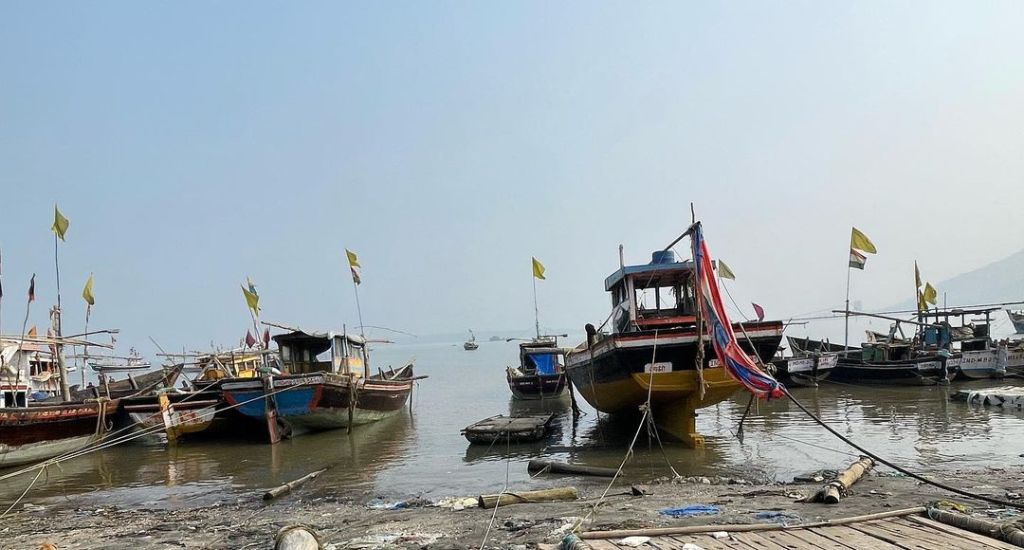
Echoes of Portugal ring out in tiny Maharashtra village
Home to 250 Catholic families, the coastal village of Korlai in Maharashtra stands out for its preservation of a rare creole dialect called Kristi, a mix of Portuguese, Marathi and Konkani.

Home to 250 Catholic families, the coastal village of Korlai in Maharashtra stands out for its preservation of a rare creole dialect called Kristi, a mix of Portuguese, Marathi and Konkani.
Vibrant homes, a palm-fronded beach, a weather-worn fort watching over the sea, a 15th-century church, a distinctive Last Supper painting… remnants of over two centuries of Portuguese colonial rule. The picturesque Maharashtrian coastal village of Korlai is just like Goa — 525km north of the real região.
However, Korlai offers much more than meets the eye in sight and sound. The village of 250 Catholic families stands out for its preservation of a rare Portuguese creole dialect locally known as Kristi. It is perhaps the only Indian village where this creole is still spoken, reflecting its rich Lusophone heritage.

The Portuguese creole spoken here is a distinct dialect that has evolved over time, incorporating Marathi and Konkani words into its vocabulary. While the locals can understand proper Portuguese, the reverse is not always true — the Korlai dialect has its own distinct flavour, shaped by centuries of isolation and adaptation.
“The reason why the creole has survived over the years is because the village was on an island, isolated from the mainland. This allowed the language to thrive without much outside influence,” said Father Francis D’Souza, a young Catholic preacher in the village.
It is a mixed language with its own distinct characteristics, spoken by fewer than 1,000 people from the predominantly Catholic Christian agriculturist community in Korlai.
Over time, the village spanned out, although it still sits in the estuary of Kundalika, where the river meets the Arabian Sea. A bridge built in 1986 connects the village with the mainland.
Located between touristy Alibaug and Murud-Janjira, the village of Korlai evolved when the Portuguese arrived in India in the 15th century and established their presence in the Konkan region, using state machinery and the Cartaz system to control their power on the western coast of India.
Also Read: This Maharashtra village is home to 10 aromatic rice varieties
It served as a transit camp for Portuguese seafarers. The dialect is believed to have come into existence abruptly, due to the contact between Marathi-speaking locals and Portuguese traders and soldiers who settled in the region.

Portuguese influence on the development of Korlai’s creole was big, with the language used in church, education and government. The dialect is more Portuguese than Marathi, with many words and expressions borrowed from both languages.
The Portuguese impact is evident in the architecture, too. Houses painted in bright colours, similar to those found in Goa, and small chapels on street corners are common sights. A 15th-century church, where Mass is still conducted in Marathi, is adorned with a painting of the Last Supper.
Father Adolph, another priest in the village, recounted Korlai’s unique history: “This is home to descendants of the Portuguese, who ruled Korlai and Chaul (Alibaug) from 1510 to 1740. For over 200 years, the Portuguese governed this region until they were defeated by the Marathas in 1740. The nearby historic Korlai fort still bears Portuguese emblems and royal insignias, reminding us of that era.”
He gestured towards a bunch of children playing: “These kids with distinct brown eyes are a legacy of their Portuguese ancestry.”
During a walk through the local church, Father Adolph pointed to an old plaque in Portuguese. Inside the church, he showed the Last Supper painting.
Also Read: This venture is all about Konkan coconuts

“This image is not found in any of the contemporary churches across India,” he said. “Our church services were conducted in Portuguese until the 1960s, when we switched to Marathi due to a lack of Portuguese-speaking local priests. The 250 families here, totalling around 800-1,000 people, still speak Portuguese creole.”
However, according to Father Adolph, the dialect has its quirks. “It has incorporated many Marathi words. While locals understand Portuguese, someone from Portugal or a speaker of standard Portuguese might struggle with our creole,” he said.
Despite its historical isolation, which helped preserve its unique language and culture, Korlai faces modern challenges such as limited access to education and employment opportunities.
“There is no regular public transport to Alibaug, where most of the colleges and educational institutes are located, forcing many children to drop out after completing class 10,” Father Adolph said.
When asked if they receive any support from the Portuguese or Indian governments to preserve the dialect, the preacher sighed before he answered: “There has been no assistance. We fear that Korlai’s unique culture and language may be absorbed by larger neighbouring communities. A large industrial project once provided jobs but has since shut down, leaving many villagers unemployed.”

The Portuguese are long gone, and people in Korlai hardly relate to the colonial rulers. “Though I am confident that I will be understood in Portugal, unlike Goa, the citizens here receive no special preference and have no path to becoming Portuguese citizens. They seem largely unconcerned; they do not culturally associate themselves with a tiny faraway European nation,” said Korlai resident Maria, who like everyone in the village, speaks a form of Portuguese at home, peppered with Marathi and Konkani.
Also Read: Inspiring rural women who defied expectations
The lead image on top shows boats anchored at Korlai village in Maharashtra. (Photo by Akansha Deshmukh)
Akansha Deshmukh is an independent investigative journalist with a rich background in uncovering the intricacies of crime, scams, corruption, and political affairs.